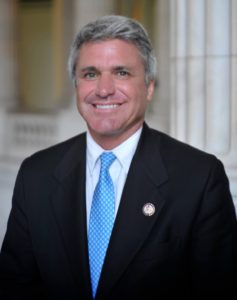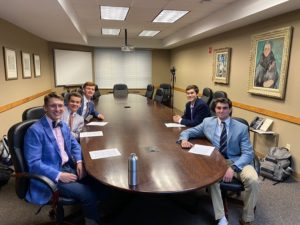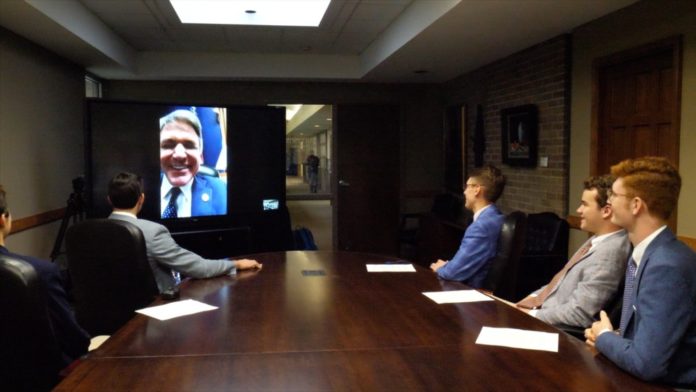“We the People of the United States, in Order to form a more perfect Union, establish Justice, insure domestic Tranquility, provide for the common defense, promote the general Welfare, and secure the Blessings of Liberty to ourselves and our Posterity, do ordain and establish this Constitution for the United States of America.”
As outlined in the preamble of the Constitution, a primary function of the federal government is to insure domestic Tranquility. The Committee on Homeland Security was created by the House of Representatives to do just that.

During the 113th and 115th Congresses, the Chairman of the House Committee on Homeland Security was Texas Republican and Distinguished Jesuit Dallas alumnus Michael McCaul ’80. As Chairman, McCaul introduced numerous bills to ensure the Department of Homeland Security could successfully carry out its mission of protecting the American people.
At the start of the 116th Congress, Congressman McCaul also became the Republican Leader of the Foreign Affairs Committee, which considers legislation that impacts the diplomatic community.
Homeland security and foreign affairs have been two areas of particular significance with recent tensions escalating in Iran. On Friday, January 10, The Roundup interviewed Congressman McCaul to pick his brain on these current events and his Congressional experience at large.
Conversation with Congressman McCaul
The Roundup’s conversation with Congressman McCaul covered topics ranging from Iran to impeachment to Jesuit and more. The full interview is featured below.

Concerning Senator Mike Lee’s recent outburst regarding the security briefing, and yesterday’s war powers resolution regarding presidential power—do you regard the President’s handling of foreign policy with Iran as responsible and prudent?
His Doctrine is to have this maximum pressure campaign on alright to get them to stop their terror activities, to stop them from obtaining a nuclear bomb.
And that’s his biggest concern. I actually had lunch in the cabinet room yesterday with the Secretary of Defense, the National Security Advisor, and my counterpart on the Senate along with Intel and armed services.
We talked about Soleimani. We also talked about Iran in general, and one of our big concerns about the Iran deal was that it didn’t deal with their malign activities or their ballistic missiles, which we saw they launched at our military installations.
The sanctions have actually been working, it’s been crippling their economy. I think ultimately the goals of the Iranian people, who I don’t believe want to live under this theocracy and oppressive government where they kill their own citizens, they shut off the internet, then they kill their own people, and I think they would be liberated from this.
But with respect to the president’s decision to take out Soleimani—I was talking to Jay Johnson, former Obama Secretary of Homeland Security—he and I are very close. He also was legal counsel to the Department of Defense, who authorized thousands of these strikes, many of which actually went into Iraq to take out terrorists.
What’s important about Soleimani is that he for the past two decades has been the mastermind of terror in the Middle East. He’s killed 600 of our troops and wounded thousands more. According to Jay Johnson, who legally knows how these things work, saw it was a lawful military objective.
Since October, we’ve seen a real escalation in attacks. I think the real tipping point was when the embassy in Baghdad was attacked. It’s hard not to respond to that. Then we got this intelligence, which was exquisite, of an imminent threat.
Soleimani was traveling from Lebanon to Damascus back to Baghdad. He’s the number 2 Quds force leader. The Quds force’s number one objective is to create the Shia landbridge through Iraq Syria, Lebanon to wipe Israel off the face of the Earth.
He was meeting with this guy in Baghdad, he was going to fly back to Tehran to talk to the Ayatollah to get the green light to move forward with what was going to be called a big attack. Hundreds of Americans and diplomats.
The question I asked them before yesterday was, “what if the president did nothing?” This is nothing Obama hadn’t done many times before. Some equate this along the lines with taking out Osama Bin Laden, at which time both sides of the aisle congratulated the president and administration.
If the president cannot act at all after they attacked our Embassy, and when I met with him yesterday said they were going to blow up our Embassy. If he’d done nothing and let these things happen, think of the hindsight critics if that had happened. I personally think that he stopped at the very evil force in the world. The president was very clear he does not want to start a war. He wants to stop these endless wars and de escalate.
Iran understands that if you hit them, you mean business. What we saw after they launched their attack was very interesting, that our back channels of communication through the Swiss indicated that they were willing to de escalate as well.
So we’re now in a period of de escalation, which I believe is a positive thing. I can’t predict the future. The Ayatollah is not the easiest guy to negotiate with, but I will tell you that the President would like to negotiate a better agreement with them. Nobody wants war in Iran.
In what ways is or is not the Trump foreign policy clearly distinctive from his predecessors–both Republicans and Democrats?
The criticism of the Bush Doctrine was this idea that we’re going to go into these Middle Eastern countries like Afghanistan or Iraq and occupy them and turn them into Jeffersonian democracies. Number one, it has not worked, and we can’t afford it anymore. I think the President wants to reduce our footprint in the Middle East, not increase it. He really has no desire to fight endless wars.
I was in the White House when he made the decision to withdraw from Syria. That was when Pelosi was pointing at him, but I encouraged him not to engage in a complete withdrawal and the chair of the Joint Chiefs was there as well as the Secretary of Defense, and I think that after the meeting, they backed up my position that we had to reduce our footprint.
It’s very imperative that we maintain a residual force to protect the homeland from threats like Osama Bin Laden, like Soleimani, who was taken out, and there are countless other terrorists we’ve been able to take out over there, so we don’t have another 9/11.
Trump’s philosophy is that if you do something that’s going to threaten America, he’s going to hit you hard. He’s not interested in creating new conflicts and expanding our footprint. I’m not an isolationist, so we have to live in the reality that it’s a global world, and we have to get along with other nations. NATO is certainly an important component. I was glad to hear him say in a speech, which I thought was very strong but reassuring speech, that we’re going to de escalate and we’re going to go through diplomatic channels, and we’re going to work with our NATO partners.
On the issue of impeachment, earlier today Nancy Pelosi said that she plans on sending those articles over next week. I know there’s been a lot of controversy about her holding onto him after the house passed them both. What are what is your hope that the Senate will do with these articles when they are sent over?
Well, I can’t speak for McConnell, but I think they would like to not have this drag on. We have a lot of business to do up here, like the USMC—a trade package with Canada Mexico that we passed in the house—they can’t get to that with this impeachment exercise. There are important issues that most Americans care about, like prescription drug prices.
All we’re asking for is fairness in the process—to do it the same way it was done for Clinton and Nixon. With Nixon, it was very bipartisan because a crime was committed, and Nixon knew he couldn’t win the Congress and was going to be removed from office, so he resigned. This has a very different feel to it.
It felt like the key witnesses weren’t even pursued through the courts when executive privilege was given, so I keel Molten, and Mulvaney, and Pompeo and Giuliani, who would have relevant testimony, just didn’t seem to come out.
I actually have a unique role on this. Because we appropriated the money for Ukraine in February, and in the summer, Mulvaney rescinded four billion dollars in foreign assistance, so both the chairman of Foreign Affairs and myself, the lead Republican, and our counterparts in the Senate, sent a letter to the administration asking them to obligate the funding as Congress had asked.
They did obligate the four billion, but they did kept the Ukrainian assistance security systems at bay, so the chairman and I sent a letter on September 5th asking the administration to obligate that security assistance to fight against the Russians. Then September 11th, they obligated the funding.
I had no idea what was going on in the summer. We were sort of scratching our heads as to why this assistance was being held up. Ukraine is one of the most corrupt countries in the world. I think the president wanted some assurance that their new president was not going to be corrupt. He demonstrated he wasn’t. He had a new parliament, passed anti-corruption measured, and I think he had enough confidence in at that point to give taxpayer dollars knowing it’s not going to a corrupt administration.
One of the remarkable things about President Trump is that even with impeachment, he has still remained very popular. What policies do you think that he is implemented in his work that have helped them capture the hearts and minds of so many Americans?
The economy. What we were able to do with the tax break and bringing off-shore assets back into the United States without a tax liability particularly has had a huge impact on the economy. I think you couple that with the USMCA, which I think will pass, then the China trade deal on just the trade imbalance. I talked to Dr. Larry Kudlow, the economic advisor to the president, and he said that if you think this year was strong, next year is going to be even stronger.
So I think we’re going to have a very strong economy going into the next election cycle, and that’s a plus for people like myself and the president going into a reelection is the economy.
Secondly, they want to feel safe. They want to feel they have a strong president who doesn’t lead from behind, a president who doesn’t project weakness throughout the world but rather strength.
I go back to my dad’s generation World War II, Churchill talked about weakness and vice aggression, appeasement with Hitler, and what happened there, and I’d look at Reagan, who, projected that peace through strength. The increase in defense, the pay raise to our troops, projects that strength that we need.
Our main adversaries are the foreign nation states Russia, China, North Korea, and Iran. They have a bit of an alliance together, and it’s important as China develops these hypersonic weapons and have satellites going into space, that we keep up. We created the space force, which is a big deal, and it’s going to make us more competitive with countries like Russia and China when it comes to space. Those are all very positive things that I think give the American people reassurance that we’re not going to project weakness anymore.
Congressman, you know that in our state, the largest cities now tend to vote overwhelmingly Democrat. Do you think that in the near future Texas may become more competitive for Democrats, and what do you think Republicans need to do to ensure that they remain successful in our state?
I think we need a younger influence. The Democrats have always been better at social media, so I think we’re catching up to that, but we need to project our message better that we’re not a bunch of old angry white guys, that we can be kind of cool. I think that David Crenshaw is a good example, a new generation of conservatism that appeals.
I go back to my freshman year in college, and Reagan brought in a whole new generation that was mine, because he restored our national security, and he restored our economy.
Is the president always politically correct? No. Do I agree with his style? No. It’s not my style, I’m more statesmanlike, but I think the Republican party is doing a better job of being more inclusive and reaching out and including diversity. I’ve got a bunch of college interns, 25 of them, and they’re majority ethnic minority.
We’re trying to energize young voters on issues like childhood cancer, human trafficking issues, that we’ve worked on extensively. These are issues that reach out to more independent voters.
One thing Jesuit taught me was to be a man for others and to serve others. That service was instilled in my brain and my heart, making the world a better place than when we came into it. So I passed what’s called the Global Hope Act, which will take what Texas Children’s has done in Botswana. In the United States, we have an 80% survivorship rate, but in Africa, it’s a 90% mortality rate for those diagnosed, which is astounding. I passed this Global Hope Act that’s going to the floor that’s really going to take this mission overseas in almost a missionary way. We anticipate that this will save probably a million kids over there.
What do people not understand or misunderstand about Congress?
That it’s very hard to get things done. It’s very frustrating. I’ve been very fortunate; I’ve had more bills passed than any Republican because I have a chairman that I work very well with. I like to be bipartisan because if I’m not, I can’t get anything accomplished. We’ve passed more bills than any committee in the house, we were written up in Role Call as the most bipartisan committee on the hill.
We’re working across the aisle to get good things done for the American people. I think at the end of the day, that’s what most people want out of the representatives. They didn’t elect me to come up here and fight and go down in flames with a burning flag in my hand; they want me to get things done.
We’re all Americans at the end of the day, and when I can, I always try to be bipartisan because to your point, most people don’t know how hard it is to get a bill passed at all.
To switch gears, I’ll ask you about your Jesuit experience: what was your most profound memory from when you went to Jesuit?
Friends that I made. I’m still in touch with them today. I think the senior retreat always really stood out in my mind, the agape experience, being a man for others, and what the Jesuits instill in you, and I think being the academics of the Church, it’s just one of the best education, the best college prep, you can get.
They taught us to question faith, to question ideas, not just take them because they’re saying it’s true. And that I thought was interesting, and I learned so much from the experience. I enjoyed the athletics but also the academics. I was an honor roll student, and it really prepared me for life at a very young age, and I still draw on that experience today.
To close it out, one final question: what is your go-to Whataburger order?
That’s my favorite stop. I get everything on it with cheese and jalapeno.
Stay tuned to The Roundup for current political news and interviews!






